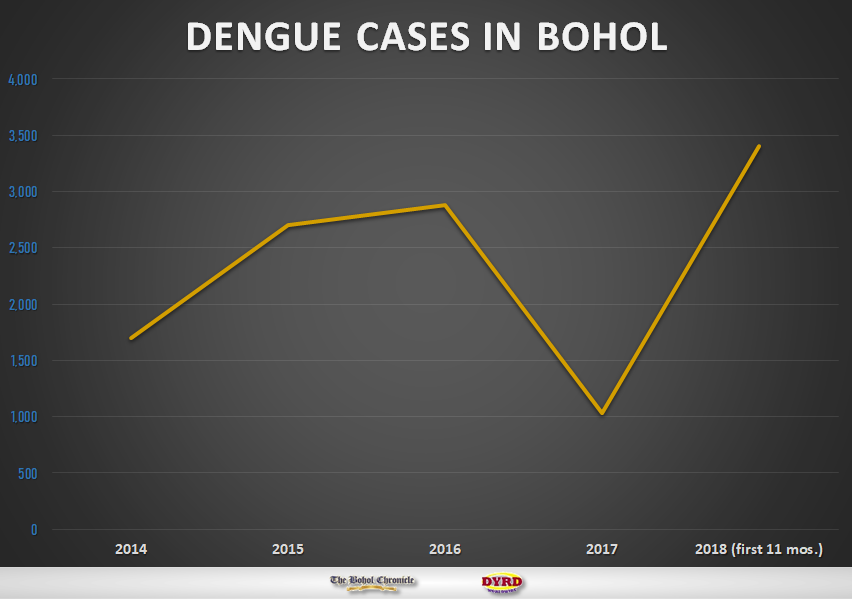The number of dengue cases recorded in the province for 2018 continued to soar to 3,408 as of December 1, posting a staggering 249 percent increase compared to the same period last year, according to data from the Department of Health’s Regional Epidimiology and Surveillance Unit (DOH-RESU) 7.
The figure, which was tallied in the first 11 months of 2018, was the highest in at least five years as health authorities annually recorded 1,695 cases in 2014, 2,600 cases in 2015, 2,878 cases in 2016, and 1,028 cases in 2017.
Based on the same data from RESU 7, 44 individuals have died due to complications of dengue in the first 11 months of 2018.
A total of 1,351 dengue cases and seven deaths due to the infectious disease were recorded in less than a month from November 8 to December 1.
Data from the RESU showed that health authorities recorded 2,057 cases and 37 deaths as of November 8, 2018 and 3,408 cases and 44 deaths as of December 1, 2018.
According to the RESU, most of the dengue cases were recorded in Tagbilaran City, Dauis and Loon at 507 cases, 308 cases and 211 cases, respectively, for the first 11 months of the year.
The Provincial Health Office has intensified its efforts against dengue as it deployed four task force teams to the province’s various localities, particularly in the 12 municipalities with the most number of dengue cases, to conduct an information campaign.
For his part, Governor Edgar Chatto appealed to DOH 7 director Doctor Jaime Bernadas to deploy additional nurses at the national government-administered Governor Celestino Gallares Memorial Hospital, the largest public health facility in the province, to help cater to dengue patients.
Municipalities, particularly Dauis which reached a dengue outbreak level status in November, have started misting operations and massive simultaneous clean-up drives.
However, DOH 7 medical officer Dr. Ronald Buscato, noted that worse could still be ahead for the province and the rest of the country as 2019 could be the dengue “epidemic year” for the Philippines based on historical trend.
“Historically, every two years man gud mo-saka ang cases. Actually challenge sad na sa World Health Organization namo nga ‘please try to stop this trend’,” said Buscato in an earlier interview.
He said that “aggressive” measures such as the use of chemicals and misting operations should be implemented to combat the dreaded viral disease.
The misting will be carried out in four cycles for an entire month together with “search and destroy” and IEC (information, education and communication) activities.
“Kay taas naman g’yud ta kaayo’g kaso, magpadayon ta sa atong 4S, pero karon, it’s high time na mag-agresibo na ta. Based sa atong guidelines, pwede na ta mo-gamit og chemicals,” he said.
Buscato however noted the need for proper coordination between local government units and the public to effectively implement the measure.
“Sa misting, hilanglan g’yud nato cooperation sa tanang taw kay kung dili gyud mo cooperate tanan, bisag na-mist nato halos tanang balay sa area, og naay usa na mo-balibad ‘nya naay daghang lamok didto, posibli na mo katag ra gihapon ang lamok. Dali ra kaayo maka-breed ang lamok, mura’g useless ra gihapon ang atoang misting,” he added.
The DOH official also highlighted the importance of individual efforts to prevent life-threatening complications of dengue and the spread of virus-carrying mosquitoes through the 4S strategy which involves searching and destroying mosquito breeding places; securing self-protection; seeking early consultation; and supporting fogging and spraying in hotspot place.
There is no specific treatment for dengue fever so far.
According to the World Health Organization (WHO), patients should seek medical advice, rest and drink plenty of fluids.
“When warning signs of severe dengue are present, it is imperative to consult a doctor and seek hospitalization to manage the disease,” the WHO said.
In 2016, a vaccine for dengue, Dengvaxia, was rolled out in the country but it was later rocked with controversy.
The vaccine program which was started during the Aquino administration was suspended last year after Dengvaxia manufacturer, pharmaceutical giant Sanofi Pasteur, warned that those immunized with Dengvaxia, but did not have a prior dengue infection, could contract more severe dengue symptoms.
However, the Committee for Medicinal Products for Human Use (CHMP) in October, this year recommended granting a marketing authorization for Dengvaxia in the European Union (EU).
CHMP, in an opinion, labeled Dengvaxia as the first vaccine in the EU “for the prevention of dengue disease caused by dengue virus serotypes 1, 2, 3 and 4 in people who are between 9 and 45 years old, live in an endemic area and already had a prior dengue virus infection.”
CHMP is the European Medicines Agency’s (EMA) committee responsible for human medicines.
According to the EMA, the CHMP plays a vital role in the authorization of medicines in the EU. (RT)

